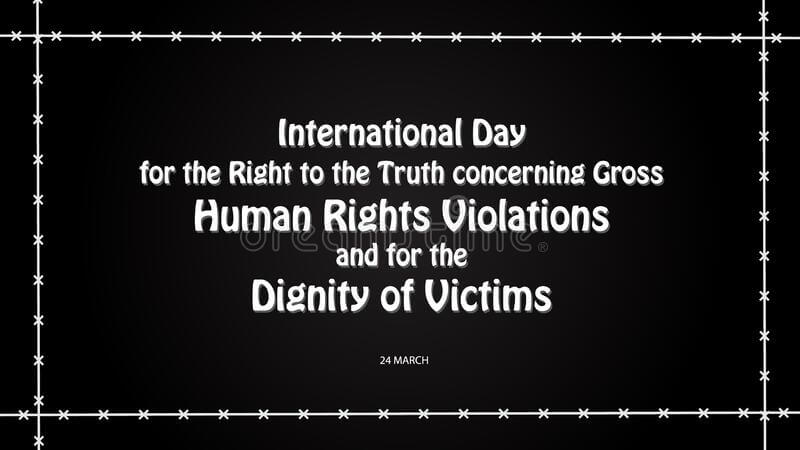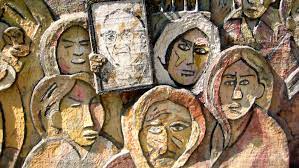Remarks by David Alton at the Webinar:
I am delighted to take part in the International Day for the Right to the Truth concerning Gross Human Rights Violations and for the Dignity of Victims organised by the Coalition for Genocide Response. I am especially pleased to share a platform with Alex Crawford and Christina Lamb – two remarkably courageous journalists whom I have long admired.
This commemorative day rightly puts centre stage, the victims and survivors of gross human rights violations by simply focusing on the truth concerning the atrocities perpetrated against them. Invariably they have suffered grievously for speaking truth to power, speaking truth to injustice, speaking truth to tyranny.
The English playwright and poet, Ben Jonson once wrote: Stand for truth, it’s enough.
But, in reality, too often we collaborate by remaining silent, failing to speak, failing to act when a courageous word of truth might have made all the difference. How often are we silenced by the fear of speaking out?
It is often said that in war the first casualty is truth. But even in peacetime, we conceal inconvenient truths or take Trappist vows when our voices should be raised.
This commemorative day was established to honour the memory of victims, to promote the importance of the right to truth, but it is also a moment to pay tribute to those who have devoted their lives to be the voice for the voiceless.
The day was also established to recognise the important work of Monsignor Oscar Arnulfo Romero, of El Salvador, who, as the UN Resolution establishing the day, states, ‘was actively engaged in the promotion and protection of human rights in his country, and whose work was acknowledged internationally through his messages, in which he denounced violations of the human rights of the most vulnerable populations.’
Romero is commemorated on a plinth not far from where I am sitting, on the western wall of Westminster Abbey.
Close by is a statue of Maximilian Kolbe, who was a Polish victim of the Nazis – executed after he took the place of a condemned man in a firing squad at Auschwitz.
Kolbe had been taken to the camp for using his mass circulation religious newspaper to condemn Nazi atrocities. After they had given him the right to continue publication so long as he stuck to pieties he wrote an editorial in which he said “beyond the hecatombs of the extermination camps, of what use are the victories on the battlefield if we are defeated in our innermost personal selves”
Like Sophie Scholl and her student friends in the White Flower Movement – Kolbe and Romero – were murdered for refusing to renounce the truth.
That was then. But it’s happening now, too.
I think of Pakistan’s Minister for Minorities, Shahbaz Bhatti, who said he was willing to shed his blood for the justice and rights of the country’s persecuted minorities. He was assassinated – and no one ever brought to justice – but ten years later his voice is still heard and his words still challenge the rank injustices suffered every day by downtrodden people.
Think of Daphne Caruana Galizia. The Maltese investigative journalist and blogger who was assassinated in a car bomb on 16th October 2017 whose last sentence that she wrote before her murder were the words “the situation is desperate.” Her son Paul says that “the best way to protect journalists,” like his mother, “ is to investigate and follow up on their work.”
Today, you will hear from exceptional journalists who have risked their lives to shed light on the truth. They are the true champions of the right to truth.
For shedding light on contemporary evils truth-telling journalists are also among the victims. Over the past decade 2,658 journalists have been killed – at least 50 in the last 12 months.
And think of citizen journalists like the incarcerated Zhang Zhan a Chinese citizen journalist who covered Wuhan’s coronavirus outbreak and who, for speaking truth to power, has been left to fester in a Chinese Communist Party prison.
Every day we see situations where the right to truth is being denied.
For example, in light of the growing evidence of the CCP’s genocidal atrocities against the Uyghurs, we see the steps taken by the CCP to hide the truth – whether by banning BBC; whether by intimidating and harassing survivors and witnesses of atrocities into silence, threatening them; or even by placing them in camps where they would not be able to communicate with the rest of the world – and so prevent them from telling their stories; and by not allowing any independent investigations into the alleged atrocities.
Two weeks ago I took part in a parliamentary meeting with Hong Kong journalists – whose voices had to be put through a voice scrambler and their anonymity protected – such have been the changes in Hong Kong, where the free air of a vibrant open society has been replaced by the toxicity of authoritarianism.
I have met a bookseller from Hong Kong who was thrown into a Chinese prison because, among other things, he had been selling Communist cadres copies of 1984.
Hong Kong needs to remember George Orwell’s’ words ”There was truth and there was untruth, and if you clung to the truth even against the whole world, you were not mad….In a time of deceit telling the truth is a revolutionary act.”
In other places, as for example, in Burma, we have seen the government switching off the internet to prevent people from communicating to others what the illegal military junta is doing to them.
In Tigray, we have seen very aggressive tactics to silence anyone trying to shed light on the massacre in Axum – the shocking suffering of its people – with brave journalists uncovering atrocity crimes ranging from executions to disembowelment and with rape and starvation used as genocidal weapons.
In the case of North Korea according to a UN Report “a State without parallel“, we see information blackouts that prevent us from a clear assessment of the situation in the country, with most of the information coming from the very few who manage to escape the NK regime. Every day Article 19 of the Universal declaration of Human rights is violated – and the perpetrators get their client States to elect them to the United Nations Human Rights Council.
All of these situations demonstrate why we must commend and applaud those who work to shed light into very dark places.
Countries like the UK could do far more in ensuring that all the necessary mechanisms to monitor these depredations, to collect and preserve data, and to be able to insist on accountability, prosecutions and justice, are in place.
The perpetrators need to know that one day they will face their Nuremburg moment; that impunity will not have the last word.
The relatives of victims of a litany of atrocities, including, summary executions, enforced disappearance, abductions, need to know what happened to them.
Survivors of the atrocities also deserve to know the truth about the atrocities they were subjected to, their nature and scale.
As such, we need to address any attempts at denying them the right to truth.
Denying this right is yet another way to harm them, attack them yet again, belittle their experiences and suffering.
So, thank you for organising this event today:
Stand for Truth – it’s enough.



